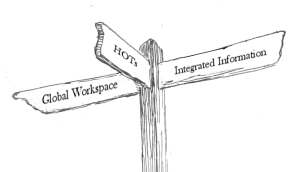
Interesting to see the review of progress and prospects for the science of consciousness produced by Matthias Michel and others, and particularly the survey that was conducted in parallel. The paper discusses funding and other practical issues, but we’re also given a broad view of the state of play, with the survey recording broadly optimistic views and interestingly picking out Global Workspace proposals as the most favoured theoretical approach. However, consciousness science was rated less rigorous than other fields (which I suppose is probably attributable to the interdisciplinary character of the topic and in particular the impossibility of avoiding ‘messy’ philosophical issues).
Michel suggests that the scientific study of consciousness only really got established a few decades ago, after the grip of behaviourism slackened. In practical terms you can indeed start in the mid twentieth century, but that actually overlooks the early structuralist psychologists a hundred years earlier. Wundt is usually credited as the first truly scientific psychologist, though there were others who adopted the same project around the same time. The investigation of consciousness (in the sense of awareness) was central to their work, and some of their results were of real value. Unfortunately, their introspective methods suffered a fatal loss of credibility, which is what precipitated the extreme reaction against consciousness represented by behaviourism, which eventually suffered an eclipse of its own, leaving the way clear for something like a fresh start, the point Michel takes as the real beginning. I think the longer history is worth remembering because it illustrates a pattern in which periods of energetic growth and optimism are followed by dreadful collapses, a pattern still recognisable in the field, perhaps most obviously in AI, but also in the outbreaks of enthusiasm followed by scepticism that have affected research based on fMRI scanning, for example.
In spite of the ‘winters’ affecting those areas, it is surely the advances in technology that have been responsible for the genuine progress recognised by respondents to the survey. Whatever our doubts about scanning, we undeniably know a lot more about neurology now than we did, even if that sometimes serves to reveal new mysteries, like the uncertain function of the newly-discovered ‘rosehip’ neurons. Similarly, though we don’t have conscious robots (and I think almost everyone now has a more mature sense of what a challenge that is), the project of Artificial General Intelligence has reshaped our understanding. I think, for example, that Daniel Dennett is right to argue that exploration of the wider Frame Problem in AI is not just a problem for computer scientists, but tells us about an important aspect of the human mind we had never really noticed before – its remarkable capacity for dealing with relevance and meaning, something that is to the fore in the fascinating recent development of the pragmatics of language, for example.
I was not really surprised to see the Global Workspace theory achieving top popularity in the survey (Bernard Baars perhaps missing out on a deserved hat-tip here); it’s a down-to-earth approach that makes a lot of sense and is relatively easily recruited as an ally of other theoretical insights. That said, it has been around for a while without much in the way of a breakthrough. It was not that much more surprising to see Integrated Information also doing well, though rated higher by non-professionals (Michel shrewdly suggests that they may be especially impressed by the relatively complex mathematics involved).
However, the survey only featured a very short list of contenders which respondents could vote for. The absence of illusionism and quantum theories is acknowledged; myself I would have included at least two schools of sceptical thought; computationalism/functionalism and other qualia sceptics – though it would be easy to lengthen the list. Most surprising, perhaps, is the absence of panpsychism. Whatever you think about it (and regulars will know I’m not a fan), it’s an idea whose popularity has notably grown in recent years and one whose further development is being actively pursued by capable adherents. I imagine the absence of these theories, and others such as mysterianism and the externalism doughtily championed by Riccardo Manzotti and others, is due to their being relatively hard to vindicate neurologically – though supporters might challenge that. Similarly, its robustly scientific neurological basis must account for the inclusion of ‘local recurrence’ – is that the same as recurrent processing?
It’s only fair to acknowledge the impossibility of coming up with a comprehensive taxonomy of views on consciousness which would satisfy everyone. It would be easy to give a list of twenty or more which merely generated a big argument. (Perhaps a good thing to do, then?)
